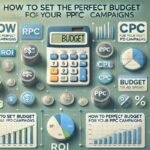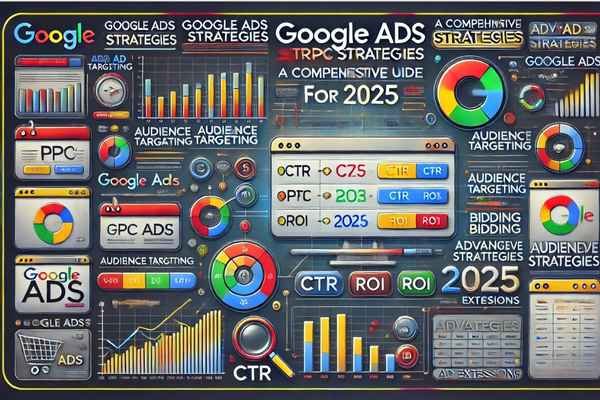
How to Set the Perfect Budget for Your PPC (Pay Per Click) Campaigns
September 30, 2024
Best On-Page SEO Tools to Optimize Your Website in 2025
September 30, 2024In the ever-evolving landscape of digital marketing, Google Ads PPC (Pay Per Click) strategies remain crucial for businesses aiming to drive traffic and conversions. Whether you’re a digital marketer, content creator, or developer, mastering these strategies is essential in 2024 to stay competitive and maximize ROI.
This guide will dive into the latest PPC strategies, discuss the nuances of Google Ads, and provide actionable insights to help you optimize your campaigns. We will also cover various tips and tools, many of which are backed by industry research and real-life examples.
Table of Contents
1. Understanding Google Ads PPC in 2025
Google Ads PPC enables businesses to bid for ad placement on Google’s search engine results page (SERP), display network, and other partner websites. Advertisers are charged only when a user clicks on their ad, which means businesses can efficiently manage budgets while focusing on high-quality traffic.
1.1 Evolution of PPC: What’s New in 2025?
As algorithms become smarter and more refined, advertisers must adapt to new trends. Some significant developments for 2025 include:
- AI and Automation: Google’s machine learning algorithms continue to improve. Automated bidding strategies and ad optimizations have become more effective, allowing for less manual input and more focus on high-level strategy.
- Audience Targeting: In 2025, advanced audience segmentation tools allow advertisers to target users with greater precision based on behaviors, interests, and search patterns.
- Video and Display Ads: With video consumption on the rise, video ads on platforms like YouTube are becoming a must for PPC campaigns. Similarly, display ads on the Google Display Network (GDN) provide expansive reach.
Tools for Optimization:
- Google Ads Smart Bidding: Uses machine learning to optimize bids for conversions or conversion value.
- Keyword Planner: For finding long-tail keywords and search volume data.
2. Keyword Research: The Foundation of a Successful PPC Campaign
One of the most critical steps in crafting a successful Google Ads PPC campaign is keyword research. Identifying high-performing keywords ensures that your ads are shown to users with strong buying intent.
2.1 Long-tail Keywords
In 2024, long-tail keywords will continue to offer a higher click-through rate (CTR) and lower competition. They are essential for niche marketing campaigns, allowing advertisers to target highly specific audiences.
Example: Instead of bidding on “running shoes,” a long-tail keyword might be “affordable running shoes for women.”
2.2 Negative Keywords
To avoid wasting ad spend, it’s vital to use negative keywords—terms that prevent your ads from being shown to irrelevant searches.
Practical Tips:
- Regularly update your negative keywords list.
- Use tools like Semrush and Ahrefs for keyword research and competitor analysis.
3. Crafting Compelling Ad Copy for 2025
Your ad copy needs to grab attention and communicate your message in as few words as possible. Effective PPC ad copywriting requires precision and creativity.
3.1 Writing Headlines that Convert
In Google Ads, your headline is often the first thing potential customers will see. A strong headline increases the likelihood of clicks.
- Use Power Words: Words like “exclusive,” “limited,” or “free” can trigger immediate engagement.
- Include Keywords: Always incorporate your target keyword in the headline for SEO and relevance purposes.
3.2 Ad Extensions: Enhancing Your Visibility
In 2024, using ad extensions will be critical to increase the size and appeal of your ads. Extensions like sitelinks, callouts, and structured snippets provide users with additional information and encourage interaction.
Pro Tip: Use location extensions to display your business address to local customers.
4. Advanced Targeting Options in Google Ads
Google has introduced advanced targeting capabilities, allowing advertisers to get more specific with their audience.
4.1 Audience Segmentation
Google’s custom audiences allow advertisers to create audience segments based on a combination of search behavior, app engagement, and in-market activity. This means you can target people who are actively searching for products or services similar to yours.
4.2 Retargeting in 2024
Retargeting allows you to re-engage with users who have previously interacted with your brand but didn’t convert. In 2024, retargeting will rely heavily on first-party data and a cookieless world due to evolving privacy regulations.
Best Practices:
- Use dynamic retargeting for eCommerce to show users the exact products they viewed on your website.
- Apply Customer Match to target customers using their email lists, which has shown higher conversion rates.
5. Budgeting and Bidding Strategies
Managing your ad spend is a crucial aspect of a successful PPC campaign.
5.1 Smart Bidding
Google’s Smart Bidding strategies use machine learning to optimize bids, allowing advertisers to maximize conversions. Smart Bidding strategies include Target CPA (Cost Per Acquisition), Target ROAS (Return on Ad Spend), and Maximize Conversions.
5.2 Manual Bidding
While automation is powerful, some advertisers prefer manual bidding for better control over individual keyword bids. This is particularly effective for smaller budgets.
6. Measuring and Optimizing Campaign Performance
To ensure your campaigns remain profitable, continuous tracking and optimization are required.
6.1 Key Metrics to Track
- CTR (Click-Through Rate): A high CTR indicates that your ad copy and keywords are relevant to your audience.
- Quality Score: Google assigns a quality score based on your ad’s relevance, expected CTR, and landing page experience.
- Conversion Rate: Measures how many clicks led to actual conversions (e.g., sales, sign-ups).
6.2 A/B Testing
To improve performance, run A/B tests on various elements such as ad copy, landing pages, and keywords. Use tools like Google Optimize or Unbounce for A/B testing.
Google Ads PPC (Pay Per Click) Strategies : A Comprehensive Guide for 2025, Recap
Top Google Ads PPC Tools and Strategies for 2025
| Tool/Strategy | Best For | Key Features | External Link |
|---|---|---|---|
| Google Ads Smart Bidding | Automated Bidding | Machine learning for bid optimization, maximize conversions | Visit Site |
| Keyword Planner | Keyword Research | Find long-tail keywords, search volume data | Visit Site |
| Dynamic Retargeting | eCommerce Retargeting | Shows users the exact products they viewed | Visit Site |
| SEMrush | Competitor Analysis | Keyword research, performance comparison, ad tracking | Visit Site |
| Google Analytics | Performance Metrics | Track campaign performance, analyze audience behavior | Visit Site |
Frequently Asked Questions
What is the best bidding strategy for Google Ads in 2024?
The best bidding strategy depends on your goals. For maximizing conversions, Smart Bidding is highly effective. However, for smaller budgets, manual bidding may provide better control over spending.
How often should I update my negative keyword list?
It’s recommended to review and update your negative keyword list at least once a month. This helps avoid wasting ad spend on irrelevant searches.
Can video ads improve my PPC campaign performance?
Yes, with video consumption increasing year over year, integrating video ads into your PPC strategy can significantly boost engagement and conversion rates. Platforms like YouTube provide extensive reach.
Conclusion
In 2024, succeeding with Google Ads PPC strategies will require a blend of automation, creativity, and data-driven decisions. By leveraging the latest tools, focusing on precise audience targeting, and constantly optimizing your campaigns, you can achieve substantial results.
Implement these strategies today and keep experimenting with your approach to stay ahead of the competition. Whether you’re targeting local customers or a global audience, Google Ads remains a powerful platform for driving business growth.
Don’t forget to explore tools like Semrush or Google Keyword Planner to refine your PPC efforts and maximize returns.








